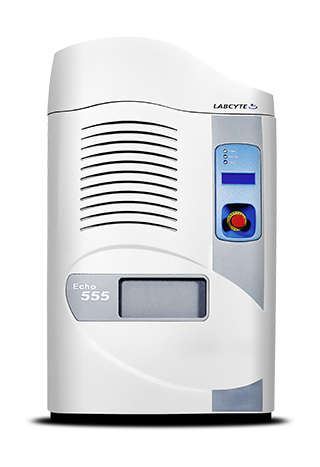Echo Liquid Handling for
SYNTHETIC BIOLOGY
A significant increase in efficiency and speed while reducing costs
Miniaturize and Accelerate DNA Assembly and QC for Gene Synthesis
Echo Liquid Handlers integrated into an Access Workstation provide a high-throughput, fully automated system, pooling oligos, assembling constructs, and spotting colonies. Whether using the Gibson Assembly or Golden Gate cloning method, tipless acoustic liquid handling reduces costs, waste, and saves time.
Accelerating Synthetic Biology with Echo Acoustic Liquid Handling
Labcyte is accelerating synthetic biology with acoustic liquid handling, by enabling the rapid synthesis and quality control of assemblies. By reducing the assay volume by up to 100x, you'll enjoy faster, smaller volume, more accurate liquid transfers, without the risk for contact-induced volume loss or contamination.
Tipless acoustic liquid handling reduces costs, waste, and time
Traditional DNA assembly methods require reactions of 10-20 microliters per well. The Echo Liquid Handler can reduce the volume 100-fold, drastically cutting reagent costs. With the ability to reliably transfer volumes as low as 25 nanoliters, Echo systems can extend the useful life of a primer library and eliminate the need to dilute high concentration primers, saving on storage and primer costs, and preventing dilution errors. Market-leading synthetic biology companies use Echo Liquid Handlers to automate gene synthesis with higher throughput and lower cost than they could with tip-based liquid handlers.
Low Cost, Highly Efficient Library Preparation
Use of the Echo liquid handler for library preparation versus conventional liquid handlers allows for up to a 100-fold reduction in reaction volumes, dramatically reducing study reagent costs.
In addition to miniaturization, the Echo system can rapidly pool oligos or DNA fragments from library plates. Since there is no contact with fluid and no time spend changing or washing tips, the Echo system can transfer each oligo or fragment from any well of a microplate in less than a second. This can save 10-15 hours of time in a high-throughput setting. And since Echo systems have the ability to transfer volumes as low as 25 nanoliters, high concentration libraries do not have to be diluted prior to transfer, resulting in simultaneous normalization while pooling. This enables equal distribution of reads to every sample and very even representation of all samples. This greatly reduces the time to normalize and pool libraries and improves the reliability of the entire library preparation process.
Finally, assay performance is essential. The accuracy and precision of Echo Liquid Handlers eliminate noise from assay data. This enables better detection of small changes in microbes and other organisms.
(The Echo) is an extremely fast instrument... a significant savings in terms of time. We’ve been able to compress pipelines that take about 12 hours to about 3 hours.
Dr. Sunil Chandran, Amyris Biotechnologies
Synthetic Biology Workflow
Echo Liquid Handling
- DNA Assembly
- QC of DNA Assembly and Cloning/
Transfection - Cloning and Transfection
Benefits of Echo
- ● 100 fold reduction of reaction volumes
- ● Increased throughput with cherry picking
Benefits of Echo
- ● 100-fold reduction of library prep volumes
- ● Pool / normalize in one step
Benefits of Echo
- ● Increased throughput
- ● Reduced costs due to miniaturization
- Cell Dispense to Plates
- Functional Testing
Benefits of Echo
- ● Reduces input requirements and detection costs
- ● Consistency of cell transfer
- ● Robust automated system


Key Benefits
- Reduce DNA assembly costs
- Quickly pool DNA oligos or fragments to save hours per day
- Eliminate primer dilutions and dilution errors
- Eliminate the noise in assay data
GenomeFoundry@ISG Work Cell, NYU Langone |Institute for Systems Genetics
This video shows the process of analyzing yeast colonies used to assemble chromosomes in the GenomeFoundry at NYU Langone Medical Center.
FEATURED PUBLICATION
Smart DNA Fabrication Using Sound Waves: Applying Acoustic Dispensing Technologies to Synthetic Biology
Journal of Laboratory Automation (JALA) Special Issue
April 2016
School of Biological Sciences, University of Edinburgh
Abstract
Acoustic droplet ejection (ADE) technology uses focused acoustic energy to transfer nanoliter-scale liquid droplets with high precision and accuracy. This non-contact, tipless, low-volume dispensing technology minimizes the possibility of cross-contamination and reduces the costs of reagents and consumables. To date, acoustic dispensers have mainly been used in screening libraries of compounds. In this paper, we describe the first application of this powerful technology to the rapidly developing field of synthetic biology, for DNA synthesis and assembly at the nanoliter scale using a Labcyte Echo 550 acoustic dispenser. We were able to successfully downscale PCRs and the popular one-pot DNA assembly methods, Golden Gate and Gibson assemblies, from the microliter to the nanoliter scale with high assembly efficiency, which effectively cut the reagent cost by 20- to 100-fold. We envision that acoustic dispensing will become an instrumental technology in synthetic biology, in particular in the era of DNA foundries.
VIEW PUBLICATIONCUSTOMER VIDEO TESTIMONIAL
Amyris Scientists|in collaboration with Labcyte Inc.
Scientists from Amyris Biotechnologies Discuss the Echo Liquid Handler
FEATURED INFOGRAPHIC












